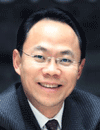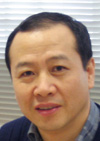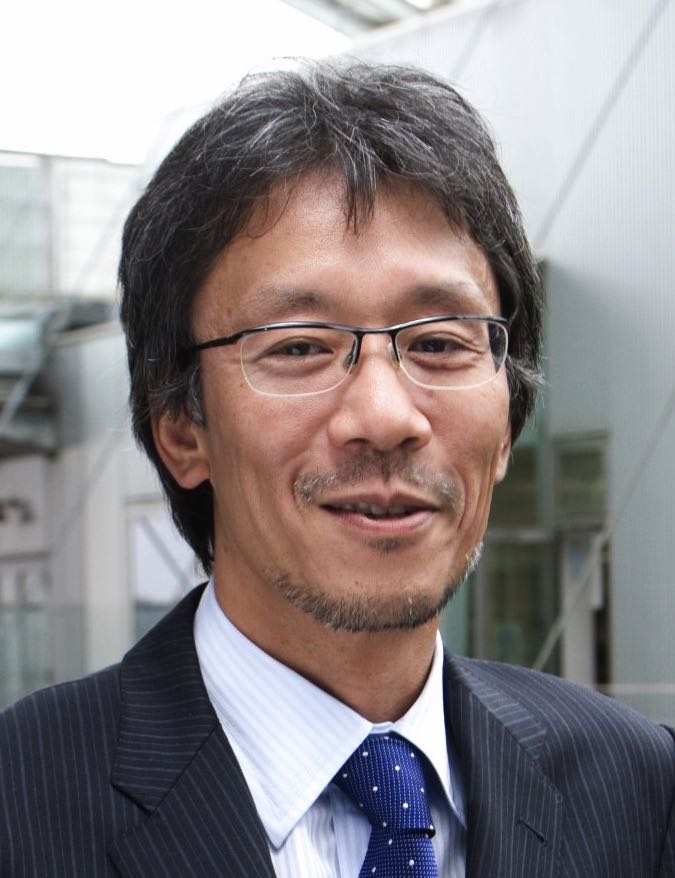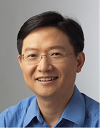Co-Located Conference AgendasGenomics Research Asia | Screening Asia | 

Tuesday, 12 November 201300:00 | Nanoplasmonics Enhanced Molecular and Cellular Imaging: “Chip” Solutions to Expensive Bioimaging Problems
Logan Liu, Associate Professor, University of Illinois at Urbana-Champaign, United States of America
Low-cost high-performance nanoplasmonic chips will be demonstrated to enable new capabilities and enhance sensitivity in label-free mobile biomolecular sensing and confocal fluorescence cell microscopy imaging. | 00:00 |  | Keynote Presentation Microarray and Microfluidic Chips for Preventive and Personnalized Medicine
Jing Cheng, CEO, CapitalBio, China
|
| |
Provisional Agenda |
| | 08:00 | Lab-on-a-Chip Technology as a Biomimetic Platform for Biomedical Applications
Jianhua Qin, Professor, Dalian Institute of Chemical Physics, Chinese Academy of Sciences, China
| 08:00 |  | Keynote Presentation What's Matter of Optofluidics between Light and Liquid
Ai Qun Liu, Professor, Nanyang Technological University, Singapore
|
| 08:00 |  | Keynote Presentation Commercialization of Microfluidic Devices for Point-of-Care Diagnostics
Vincent Linder, CTO, OPKO Diagnostics, United States of America
|
| 08:00 | Microfabrication for Electroporation
Zhihong Li, Professor, Peking University, China
Microfabrication enables electrodes with minimized spacing, which can be used for cell electroporation with lower applied voltage, lower cost and more precise control. In this talk, some major issues in microfabricated electroporation chips will be addressed. | 08:00 | Droplet-in-Oil Microfluidics for the Lab-on-a-Disc Platform
Ho Pui Ho, Professor, The Chinese University of Hong Kong, Hong Kong
We report the use of droplet-in-oil strategy in a lab-on-a-disc (LOAD) device platform. While surface tension can be removed completely, actuation force depends entirely on spinning speed and density difference. Droplet manipulation as required by common bioassays will be discussed. | 08:00 | Capillary-Array Micro Analytical Devices as Mass-Producible Multi-Analyte Biosensing Tool
Hideaki Hisamoto, Professor, Osaka Prefecture University, Japan
Capillary-array microanalytical devices capable of mass-production and multiple chemical sensing of different chemical species were developed. Development of various capillary-based sensors, array devices, and some applications including serum component analysis or inhibitor assay will be presented. | 08:00 |  | Keynote Presentation Lab-on-a-Chip Technologies – Pushing the Limit of Understanding
Teruo Fujii, Professor, University Of Tokyo, Japan
Lab-on-a-Chip or microfluidics technologies enable us to achieve much higher resolution in space and time for our experiments. By applying these technologies, we could push the limit of understanding in various research fields including biological and environmental sciences. |
| 08:00 | Development of a Pocket DNA Diagnostic Device
Jonathan O'Halloran, Chief Scientific Officer/Co Founder, QuantuMDx Group Ltd, United Kingdom
The era of drug resistance infectious disease is upon us and we need tools to combat this emerging threat. Jonathan will talk about the development of a novel handheld multiplex, sample to result MDx platform that is capable of providing complex MDx in under 15 minutes. | 08:00 |  | Keynote Presentation Microfluidic Platforms, Microfluidic Apps and Microfluidic Foundry Services
Roland Zengerle, Professor, University of Freiburg, Germany
The talk promotes three major issues that enable to speed up Lab-on-a-Chip development and reduce time to market: i) the use of microfluidic platforms, ii) the development of Microfluidic Apps for existing lab instruments and iii) the offer of microfluidic design & foundry services. Various examples based on the use of centrifugal microfluidics platforms will be given to illustrate the impact of those issues especially for point-of-care applications. |
| 08:00 | Microfluidics for Cancer Detection and Diagnosis
Chwee Teck Lim, NUS Society Chair Professor, Department of Biomedical Engineering, Institute for Health Innovation & Technology (iHealthtech), Mechanobiology Institute, National University of Singapore, Singapore
We present a suite of microfluidic biochips that are able to detect and retrieve rare viable circulating tumor cells from blood of cancer patients without using antibodies. These biochips have been commercialized and are undergoing clinical tests around the world. | 08:00 |  | Keynote Presentation Using Phononic Crystals to Shape Complex Fluid Flows
Jon Cooper, Professor, University of Glasgow, United Kingdom
We have developed phononic crystals that shape acoustic fields as "acoustic holograms", enabling the control of fluid flows. We demonstrate the technology in biomedical diagnostics to enable PCR, cell lysis and sample manipulation - with applications in rapid diagnostic tests. |
| 08:00 | Single Cell Transcriptome Analysis Using a Microfluidic Device
Yanyi Huang, Professor, Peking University, China
We develop a microfluidics-based single cell RNA-Seq transcriptome analysis technology to make majority of the reaction steps at nanoliter volume within sealed chambers on-chip, eliminating potential contaminations and sophisticated manual handlings. | 08:00 | Microfluidic Synthesis of Structured Functional Materials - From Plasmonic Nanoparticles to Organic Microcrystals
Saif Khan, Associate Professor, Chemical and Biomolecular Engineering, National University of Singapore, Singapore
Microfluidics is a tremendously promising technology for chemical and materials synthesis due to the inherent, remarkable level of control of physical transport phenomena and their interactions with chemical reactions. In this talk I will demonstrate microfluidic methods for the exquisitely controlled synthesis of two very different materials classes – metallodielectric (silica-gold) particles with tunable plasmonic properties and organic microcrystals relevant for pharmaceutical drug formulations. | 08:00 | Micro Device for Measuring Cell Function and for Tissue Engineering
Hidetoshi Kotera, Professor, Kyoto University, Japan
In the field of re-generative medicine, understanding the function of cell and tissue is key issue. To understand the cell and tissue functions, many micro devices, called Micro TAS( Total analysis systems) are proposed and used in the field of medicine and life science research. For studying the function of the pancreas islet we have developed two types of novel microfluidic device for space- and time-resolved visualization of intracellular events when a cell surface is partially exposed to external stimuli. | 08:00 | Nanobiodevices-Based Single Biomolecule and Single Cell Analysis for Cancer Diagnosis/Therapy and Stem Cell Therapy
Yoshinobu Baba, Professor, Nagoya University, Japan
I will describe the development of nanobiodevices to apply to CTC detection for cancer metastasis diagnosis, nanobiodevice for single DNA sequencing, single molecular epigenetic analysis, in vivo imaging for stem cell therapy and theranostic device for cancer diagnosis/therapy. | 08:00 | The Microfluidic Toolbox – A Fast-track Towards Integrated Lab-on-a-Chip Systems
Claudia Gärtner, CEO, microfluidic ChipShop GmbH, Germany
Lab-on-a-chip technology is the key to a novel way to gather analytical data enabling a “sample-in-result” out operation of the total analytical process. The advantages of a modular approach combining different functional units for the development of integrated Lab-on-a-Chip systems will be demonstrated.
| 08:00 | Whole Cell Sensing System for Environmental Monitoring
Nico Rooij, Professor, Ecole Polytechnique Federale de Lausanne, Switzerland
We present a whole cell analysis system for detection of toxins in the environment. In this system, the metabolic response of living cells to toxic compounds in the environmental water samples is the assessment tool for sample evaluation. | 08:00 |  | Keynote Presentation Interface Structures and Functions for Organs-on-Chip
Hanry Yu, Group Leader, Institute of Bioengineering and Nanotechnology A*STAR, Singapore
Organs are not defined only by a group of cells but also the distinct interface structures carrying out specific functions. We will discuss technologies to create, control and preserve these interface structures for Organs-on-Chip. |
| 08:00 | Protein Immobilization and Assay Development Issues
Jens Sobek, Research Scientist, University of Zurich, Switzerland
Assay development often suffers from artifacts of unknown origin. We present results of a microarray study showing the influence of drop drying on immobilization of oligonucleotides and proteins, and its impact on assay performance. | 08:00 | Functionalized Materials for Micro-chip Applications
Weijia Wen, Professor, The Hong Kong University of Science And Technology, Hong Kong
Functionalized material is an essential material for the design and fabrication of the micro/nano devices, while such materials with some particular character can broaden and enhance the functionalities of micro/nano chips. In this talk, we will introduce some types of functional materials which can be used for microfluidic and other devices, like heater, microfluidic mixer, sensor as well as other components. The characteristics of these materials and their capabilities used in micro/nano systems will also be discussed. | 08:00 | Micorfluidic Continuous-Flow Separation of Particles/Cells and Patterning of Particles with Dielectrophoresis
Charles Yang Chun, Associate Professor, Nanyang Technological University, Singapore
| 08:00 | Automated Droplet-based Microfluidic Analysis and Screening with Sequential Operation Droplet Array System
Qun Fang, Professor, Zhejiang University, China
An automated droplet-based microfluidic and screening system was developed with low sample/reagent consumptions in the nanoliter to picoliter range, and it was applied in single cell analysis, drug screening and protein crystallization screening. | 08:00 | Microfluidic Devices Manufacturing - Sensing and Instrumentation Challenges and Opportunities
Brian Anthony, Director, Massachusetts Institute Of Technology, United States of America
In microfluidic device manufacturing precise micro and nano-sized features are distributed over large areas. In order to inspect for defects or employ statistical process control on micro-manufactured parts, metrological instruments must collect data with submicron resolution at a rate fast enough to keep up with the pace of production. Commercial inspection instruments fall short on meeting these challenging demands. New inspection systems are required which can provide real-time measurements of transparent polymer microfluidic devices. |
|


 Add to Calendar ▼2013-11-12 00:00:002013-11-13 00:00:00Europe/LondonLab-on-a-Chip AsiaLab-on-a-Chip Asia in SingaporeSingaporeSELECTBIOenquiries@selectbiosciences.com
Add to Calendar ▼2013-11-12 00:00:002013-11-13 00:00:00Europe/LondonLab-on-a-Chip AsiaLab-on-a-Chip Asia in SingaporeSingaporeSELECTBIOenquiries@selectbiosciences.com